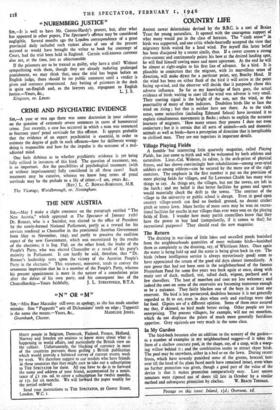AMONG newer delectations devised by the B.B.C. is a sort
of Brains Trust for young naturalists. It opened with the courageous support of what many would put in the class of heresies. The " sixth sense " in birds was supported, and one critic whole-heartedly accepted the view that migratory birds waited for a head wind. For myself this latter belief has been dissipated by a recent simile, thus. If a rower crosses a strong river-current and continuously points his bow at the desired landing spot, he will find himself rowing more and more upstream. At the end he will be almost at right-angles to his first line of advance. So a bird. It is plausible to conjecture that the migrant, with its marvellous sense of direction, will make direct for a particuar point, say, Beachy Head. If the wind has been on either flank of the bird it will arrive at the point facing up-wind, and the observer will decide that it purposely chose this adverse influence. So far as my knowledge of facts goes, the actual evidence of birds waiting to start till the wind was adverse is very small. Their starting signal is the height of the sun, not the wind, as the punctuality of many of them indicates. Doubtless birds like to face the wind on rising ; but that is neither here nor there. As to the sixth sense, some naturalists (including Edmund Selous) have invented it to explain simultaneous movements in flocks ; others to explain the accurate journeys of migrants. How many senses they possess I dare not even conjecture ; but it is certain that all sorts of animals—eels and domestic animals as well as birds—have a perception of direction that is inexplicable to civilised man. They are our superiors in important details.


























 Previous page
Previous page